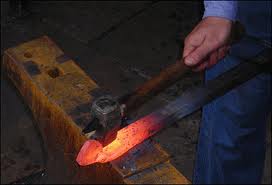Forging is the oldest known metalworking process. It’s an ancient practice that involves heating metal in order to reshape it with a tool like a hammer and anvil. For those gen-x and y readers, you might remember the anvil from Wile E. Coyote and Road Runner – aah, yes, the thing you drop from a cliff to terrorize cartoon birds.
While some metals can be cold forged, most hard metals (iron and steal) are forged with heat. The blacksmith heats the metal in a furnace and waits until it reaches the appropriate color – usually a bright yellow-orange. At this stage, it’s ready to be shaped.
As the blacksmith shapes the metal with a hammer, the grain of the metal aligns to take shape with the part. This makes the grain continuous throughout the piece, which makes for a stronger end result. Since most pieces of forged metal aren’t the end product itself, it’s even more important that it’s crafted in a way that adds to the strength of the assembled unit.
The process isn’t too complex, which is why I thought that forging metal is a lot like budgeting. Here’s why:
Budgeting Isn’t New
Making a budget is something that has been around for generations. If we want to look in the Bible, we can find verses that allude to budgeting your resources.
Luke 14:28-30
28 “But don’t begin until you count the cost. For who would begin construction of a building without first calculating the cost to see if there is enough money to finish it? 29 Otherwise, you might complete only the foundation before running out of money, and then everyone would laugh at you. 30 They would say, ‘There’s the person who started that building and couldn’t afford to finish it!’
Like forging metal, the theory of budgeting has held constant over the years, but the way it’s done has changed. Today, we can use a wide range of online tools for budgeting including sites like Mint.com, mvelopes.com and YNAB.com. The process has evolved just like technology has changed to make metalworking even more efficient.
Budgeting Strengthens Your Financial Condition
Budgeting gives you an awareness of your financial health and keeps you on track with your goals to eliminate debt and build savings. Sure, you can make it through life without a budget, but if you stick to living on less than what you earn and make it a point to track where your money goes, it’ll help you to become a better steward of the resources God has given to us.
Budgets Can be Uncomfortable At Times
In all honesty, having a budget can feel like too much work for some people. It won’t take shape right away, and that can be discouraging. It takes work and may just be a part of the solution to your financial reformation, but it’s important to have some form of a budget established, no matter how simple it is.
It’s not rocket science and I know you’ve read a lot of articles about budgeting – but sometimes I think it’s good to look at things with a different perspective.
What are your views on budgeting? Is it still applicable today? If so, what does it look like to you?
Tim is a personal finance writer at Faith and Finance a Christian financial help blog that provides financial insights for individuals, businesses, and churches. Outside of finance, Tim enjoys spending time with his wife, playing the saxophone, reading economics books, and a good game of RISK or Catan. Find him on Twitter and Facebook and subscribe to the Faith and Finance RSS feed.



Leave a Reply